GOD’S “BACKSIDE OF THE DESERT” PREP SCHOOL: LESSONS FROM BURNING BUSHES AND MUSTARD SEEDS
TODAY’S READING IN THE OLD TESTAMENT- Exodus 2:11-3:22
The Headlines from today’s readings could be quite sensational:
- Prince of Egypt- Wanted for Murder (Exodus 2:11-15)
- Pharaoh’s Adopted Son Avoids Trial and Retires from Public Life at age 40 (Exodus 2:15)
- Scandal: Celebrity marries Daughter of Midian Priest in Private Desert Hide-Out (Exodus 2:21)
- Royal turns Rural- Pharaoh’s Son Groomed for Succession chooses to be a Shepherd (Exodus 3:1)
- Speech-Impaired Royal Fears Consequence of Flubbed Interview (Exodus 3:10- 4:17)
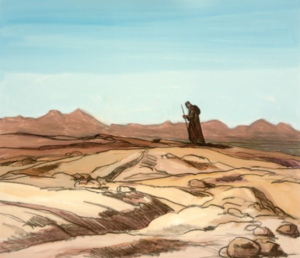 The word ‘exodus’ means ‘departure’. The ‘Book of Exodus’ describes how God provides ‘a departure’, ‘a way out’; an ‘escape’ for the children of Israel from their bondage in Egypt. You recall that God had given Abraham the prophecy hundreds of years earlier.
The word ‘exodus’ means ‘departure’. The ‘Book of Exodus’ describes how God provides ‘a departure’, ‘a way out’; an ‘escape’ for the children of Israel from their bondage in Egypt. You recall that God had given Abraham the prophecy hundreds of years earlier.
“Know for certain that your descendants will be strangers in a land that is not theirs, where they will be enslaved and oppressed four hundred years. But I will also judge the nation whom they will serve, and afterward they will come out with many possessions… in the fourth generation they will return here.” (Genesis 15:13-16)
When we read the Book of Exodus it is important that we do not forget the big picture. We must keep the Promise in view. For every ‘scheduled departure’ there is a ‘scheduled arrival’. It is not enough to depart from the old life. We must fully enter into the new. It is not enough to escape your present bondage. We not only need to know what we are saved from, we need to know what we are saved to. The Lord has a future in view.
Jeremiah 29:11 (NASB)
11 ‘For I know the plans that I have for you,’ declares the LORD, ‘plans for welfare and not for calamity to give you a future and a hope.
God provides deliverance from Egypt in order to bring His people into what He has promised for them in the future. The Promise consists of the Promised Seed (Christ) that would bless all nations and the Promised Land, a place of fellowship where God promises to dwell among His people in a covenant relationship:
Exodus 29:46 (NASB)
46 “They shall know that I am the LORD their God who brought them out of the land of Egypt, that I might dwell among them; I am the LORD their God.
The Lord brings them out of their bondage in Egypt that He might bring them in to their inheritance.
“You will bring them in and plant them on the mountain of your inheritance— the place, O LORD, you made for your dwelling, the sanctuary, O Lord, your hands established.” (Exodus 15:17)
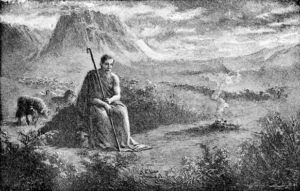 In Exodus 3 Moses is called of God to be the leader and mediator in the exodus that God will provide for His people. God intends to use Moses as an example (1 Cor 10:11). The Lord must do a work of deliverance within Moses before He can do a work of deliverance through him. The Lord must deliver Moses from reliance upon his natural strength, cleverness and pride.
In Exodus 3 Moses is called of God to be the leader and mediator in the exodus that God will provide for His people. God intends to use Moses as an example (1 Cor 10:11). The Lord must do a work of deliverance within Moses before He can do a work of deliverance through him. The Lord must deliver Moses from reliance upon his natural strength, cleverness and pride.
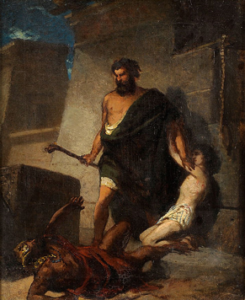 During the first 40 years of Moses life in Egypt we learn that he is brought up with the best that this world has to offer. He is a privileged son in Pharaoh’s household. He is educated in the ways of the Egyptians. He is saturated in their values and their worldview. His source of confidence and strength is in himself. He excels in that which is admired of men. He was “educated in all the learning of the Egyptians, and he was a man of power in words and deeds” (Acts 7:22). But remember the words of our Lord Jesus towards the self-satisfied, self-sufficient, self-justifying religious professionals of his day, “You are those who justify yourselves in the sight of men, but God knows your hearts; for that which is highly esteemed among men is detestable in the sight of God” (Luke 16:15).
During the first 40 years of Moses life in Egypt we learn that he is brought up with the best that this world has to offer. He is a privileged son in Pharaoh’s household. He is educated in the ways of the Egyptians. He is saturated in their values and their worldview. His source of confidence and strength is in himself. He excels in that which is admired of men. He was “educated in all the learning of the Egyptians, and he was a man of power in words and deeds” (Acts 7:22). But remember the words of our Lord Jesus towards the self-satisfied, self-sufficient, self-justifying religious professionals of his day, “You are those who justify yourselves in the sight of men, but God knows your hearts; for that which is highly esteemed among men is detestable in the sight of God” (Luke 16:15).
When Moses had grown up, he discovered that he was a Hebrew. He could not help but identify with the sufferings of his own people. When he sees an Egyptian beating a Hebrew slave, he “looks this way and that” and thinking that no one is watching, he kills the Egyptian and hides him in the sand.
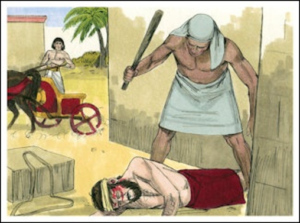 Moses was still living with a frame of reference of being ‘seen of men’ instead of ‘seen of God’. While Moses had looked ‘this way and that’, he failed to look up to God, who knows all and sees all. He failed to know that others outside his frame of reference were watching him.
Moses was still living with a frame of reference of being ‘seen of men’ instead of ‘seen of God’. While Moses had looked ‘this way and that’, he failed to look up to God, who knows all and sees all. He failed to know that others outside his frame of reference were watching him.
As leaders it is important to know that there are others, whom you may not be aware of, that are watching you. And most importantly, we must remember that God sees our every move and motive.
“Nothing in all creation is hidden from God’s sight. Everything is uncovered and laid bare before the eyes of him to whom we must give account.” (Even that which we bury in the sand!) (Heb 4:13)
The next day Moses in his efforts once again to do God’s work his own way seeks to settle a fight among two Hebrews. Instead of welcoming Moses’ peace-making initiatives, the Hebrew says, “Who made you ruler and judge over us?” It was clear that God had not yet appointed him to that task!
How important it is to wait on God’s timing and to rely on God’s strength. God’s work must be done God’s way and in His time.
For the first 40 years Moses was full of himself. Although he was sincere, compassionate and competent, he did not yet know God personally. Neither was he submitted to Him.
Soon Moses realizes that his sincere actions in the interests of his people did not have the desired effect. Pharaoh heard of his murdering the Egyptian and ordered Moses killed.
During the next 40 years Moses is being emptied of himself. He is taken from the palace to the outback. The former Prince of Egypt is now living in obscurity in the back side of the desert. He becomes a shepherd, a profession that was despised in Egypt (Genesis 46:34). He who was once at home with royalty was now a stranger in a strange land. He who impetuously took matters into his own hands would become the meekest man on earth (Numbers 12:3). He who was the pride of Egypt becomes a humble servant of God, a scrub in the desert. The ‘somebody’ has become a ‘nobody’.
What a school the backside of the desert can be! We are brought to a place where we can no longer depend on our status in society, our social network, our gadgets, our degrees and bank accounts. We are weaned from all that which gave us natural self-confidence. No one knows of your great possessions and accomplishments when you are separated from it all on the back side of the desert. Here one must learn to live a life of dependence.
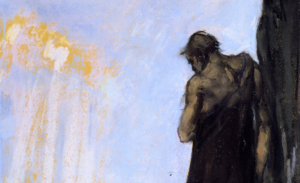 In Exodus 3, Moses is introduced to the One he is to become dependent upon. God was preparing him to be a leader in ways that he was not aware of at the time. He was being taught to lead like a shepherd. While he was pasturing the flock of Jethro his father-in-law, Moses comes to Horeb, the mountain of God. (Horeb is the mountain range. Sinai is the mountain.) Here the Lord appears to Moses in a blazing fire from the midst of the bush. Moses is astounded that the bush, although enveloped in fire, is not consumed.
In Exodus 3, Moses is introduced to the One he is to become dependent upon. God was preparing him to be a leader in ways that he was not aware of at the time. He was being taught to lead like a shepherd. While he was pasturing the flock of Jethro his father-in-law, Moses comes to Horeb, the mountain of God. (Horeb is the mountain range. Sinai is the mountain.) Here the Lord appears to Moses in a blazing fire from the midst of the bush. Moses is astounded that the bush, although enveloped in fire, is not consumed.
When the Lord saw that Moses had turned aside to look, He called to Moses from the midst of the bush as he had called to his ancestors with the double repetition of his name. He was to remove his sandals and recognize he was standing on holy ground.
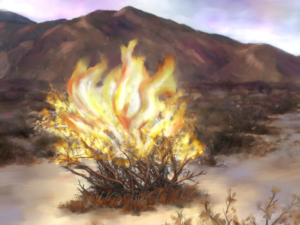 What takes place is Moses’ great commission. He feels totally inadequate for the task, but for each excuse that Moses makes of being empty of ability, the Lord promises to be his supply.
What takes place is Moses’ great commission. He feels totally inadequate for the task, but for each excuse that Moses makes of being empty of ability, the Lord promises to be his supply.
This is how it is with the Lord. The bush did not fuel the fire. The fire drew no strength from the bush. The bush was merely a platform for the glory of God to attach itself to. Therefore, if any bush boasts, may its boast be in the Lord! (1 Cor 1:29, 31)
God uses very ordinary things and ordinary people in extraordinary ways if we are willing to stay humble and give Him the glory He deserves.
God introduces Himself to Moses and announces Himself as “I AM WHO I AM”. He is the self-existent, self-sustaining, self-revealing, ever-living, ever-lasting God. He is eternal and always. He is wisdom- all knowing, all-powerful; everywhere-present, all-holy God. “I am All that you will ever need me to be.”
More than a thousand years later religious leaders would attempt to stone Jesus of Nazareth to death because he took this name to himself:
58 “I tell you the truth,” Jesus answered, “before Abraham was born, I am!” 59 At this, they picked up stones to stone him, but Jesus hid himself, slipping away from the temple grounds. John 8:58-59 (NIV)
NEW TESTAMENT READING: Matthew 17:10-27
We see that Jesus really is the Great I Am. He is the all-sufficient one. The hymn writer wrote, “All that I needed His hand has provided.”
The disciples failed to drive the demon from the boy who was bound in self-destructive habits, even throwing himself into the fire and the water. The reason they couldn’t deliver this boy was the littleness of their faith. Jesus made it clear that by ‘littleness’ he was not referring to the size of their enthusiasm, imagination, or confidence. He referred to a little mustard seed. The nature of the seed is to grow to something big, far bigger than the seed itself. We need to focus on what the seed is designed to be and do. Our faith needs to be focused on the object of our trust. Jesus refers to focusing our faith on God’s ability and will. This comes through prayer, discernment, and discipline, such as fasting (‘fasting’ is only found in some manuscripts.)
 Sometimes disciples end up focusing on principles or formulas or even using the name of Jesus without really focusing on Jesus Himself.
Sometimes disciples end up focusing on principles or formulas or even using the name of Jesus without really focusing on Jesus Himself.
Warren Wiersbe writes, “Faith like a mustard seed is living faith that is nurtured and caused to grow. Faith must be cultivated so that it grows and does even greater exploits for God (1 Thess 3:10; 2 Thess 1:3). Had the nine disciples been praying, disciplining themselves, and meditating on the Word, they would have been able to cast out the demon and rescue the boy.” –Bible Exposition Commentary (BE Series) – New Testament – The Bible Exposition Commentary – New Testament, Volume 1.
Reading through the Bible is a great discipline for strengthening and focusing your faith upon Christ. Be encouraged and watch your faith grow and the mountains that the Lord wants to move, move!
TODAY’S READING FROM THE BOOK OF PSALMS- PSALM 22
PSALM 22– This psalm is the most quoted psalm in the New Testament and is quoted by Jesus on the Cross. It gives us insight into his sufferings. (Compare with Matthew 27:42- 46)
 He embraces the forsakenness of our condition- wounded for our transgressions. This Psalm was written in the eleventh century and describes details found in the torturous death by crucifixion invented by the Roman army many centuries later.
He embraces the forsakenness of our condition- wounded for our transgressions. This Psalm was written in the eleventh century and describes details found in the torturous death by crucifixion invented by the Roman army many centuries later.
Verses 1-20 prophetically describes Jesus suffering. Notice verses 16-18:
Psalm 22:16-18 16 For dogs encompass me; a company of evildoers encircles me; they have pierced my hands and feet— 17 I can count all my bones— they stare and gloat over me; 18 they divide my garments among them, and for my clothing they cast lots.
The turning point in the Psalm is verse 21. All before that is about His suffering. All after that is praise and describes the circle of blessing brought as a result of His death and resurrection. To those reconciled and made brothers (v.22- John 20:17; Hebrews 2:12) To the seed of Jacob and Israel (v.23) and all the ends of the world (v. 27)
This is the good news- Jesus accomplished our redemption through His death, burial and resurrection. He has done it! (v. 31)
PROVERB FOR TODAY – PROVERBS 5:12-14
Proverbs 5:12-14 12 and you say, “How I hated discipline, and my heart despised reproof! 13 I did not listen to the voice of my teachers or incline my ear to my instructors. 14 I am at the brink of utter ruin in the assembled congregation.”
What is your attitude today towards discipline, teachers, instructors or those in authority? Are you demanding your own way? Living with your own interests at the helm?
OPERATION WORLD: We are praying today for the continent of Asia where over 60% of the world’s population lives in only 23.5% of the world’s land surface. Pray for the church that is growing rapidly. There are more evangelical Christians on the continent of Asia than any other apart from Africa. The church in China has a vision to complete the Great Commission. One initiative called, “Back to Jerusalem” sees the spread of the gospel going west from China to the Middle East and Jerusalem. Yet there are many areas of trouble and tension. Pray for these Hot Spots on page 61 and 62 of “ Operation World”.
PRAYER: Gracious God, we look up to You and thank You for Your perfect plan of salvation. We see how our sins have caused You grief and separated us from Your holy presences. Thank You for embracing our plight, identifying with our sin, bearing our punishment and shame upon the cross. We rejoice in the reconciliation provided by Your Son and can proclaim that He has done it! It is finished! May I enter into the goodness of what You have done and praise You in the midst of the assembly, listening to Your voice, receiving Your correction and instruction joyfully!
Pastor David
